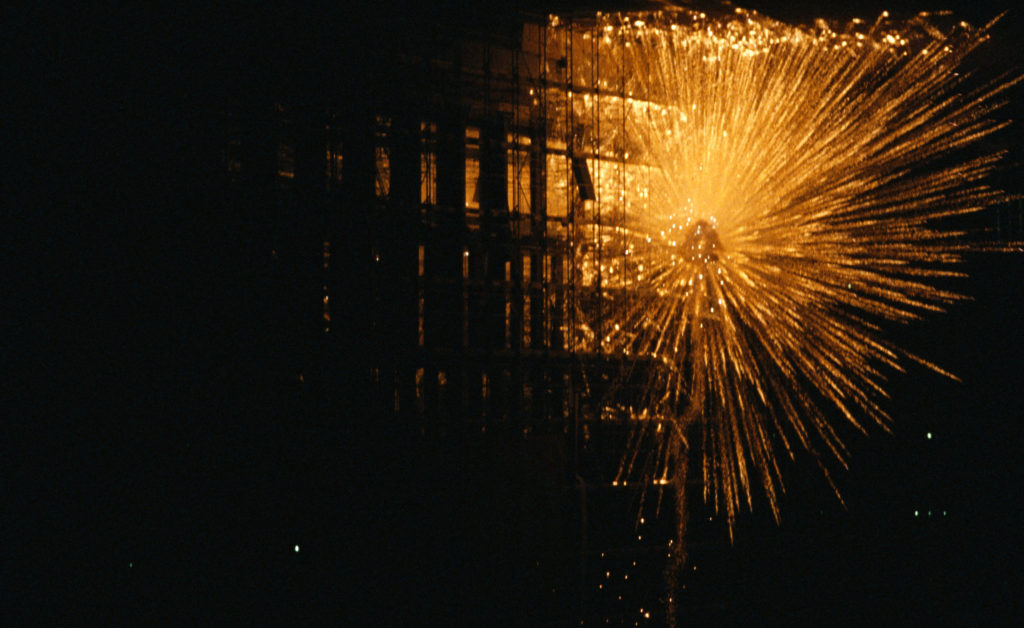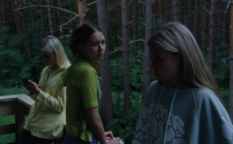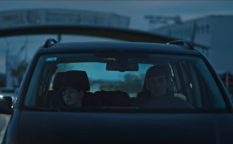Review: Nemesis (2020)

What could an old, torn down train station possibly mean to a filmmaker? For Swiss director Thomas Imbach, it opens up the book to reflect on life. His movie Nemesis, that had its world premiere in the International Feature Film Competition at Visions du Réel, documents the destruction of the former freight station in Zurich as observed from the window of his studio, and the construction of a new prison and police center in its place.
The set-up is simple. Imbach filmed the gradual process of destruction and construction with a 35 mm camera from his window for several years. The evolution of the cityscape allowed him to draw parallels to his life, those of refugees likely taking up the cells soon, and the history of the city. Narrated not by himself but Milan Peschel, there is a soothing educational tone to the storytelling.
Imbach, however, doesn’t see himself as a quiet observer only. There is a certain bitterness in his documentary. The way he plays around in editing with the construction machines and the construction workers, how he poignantly brings up the historical value of the building and the impending loss. 130 years – that is the age of the station he lets us now. A historic landmark whose trade brought prosperity to the city of Zurich. The plans to tear it down – strongly disputed.
Like a deathwatch, the last companion never leaving its side, Imbach captures the process. Day and night, summer, and winter. He offers fascinating pictures of entire roofs collapsing, excavators eating away at walls and torn apart constituents being collected in piles. Imbach doesn’t stop at observing, he manipulates the impressions. The jackhammer and the excavators don’t simply roll across the station, they waltz a dance of destruction.
Imbach and his editor David Charap play with the footage, speeding it up and slowing it down, even playing it backward, thus creating a melodic rhythm to the process. The camera lets the station crumble to bits and pieces and then in reverse resurrects it, like a wishful fantasy, an indestructible card house. Scored with a distorted, amplified sound that could come straight from a cartoon sound library, the machines come alive in an animalistic way. They are not simply mean to an end, but evoke impressions of an old stop motion King Kong or Godzilla movie, making this an interesting watch.
The voice over of the director’s thoughts ties the observed picture to the pictures in his head. The death of a piece of historic Zurich evokes the memories of those close to him that died. Imbach recounts experiences of losing his grandfather, his parents, his mentor Klaus and his friend Peter. There is even room for a direct connection between the two. They would never tear the station down, his mom once said to him. Now the pieces are crumbling before his very eye.
More pointedly, he relates the fact that the construction to be will be a prison and police center to the experience of refugees about to be deported. What will the building mean to them, he wonders. A place, so significant in inviting strangers into the city to trade and prosper, now repurposed to getting rid of them. The extinction of an important part of Swiss history in favor of more policing and security.
Imbach interweaves his accounts with stories of those who came with desperate plight to the country. It is not always clear who the voice is emulating though unless the viewer is using additional subtitles. Just as with the machinery, Imbach plays with the enormous volume of his footage, finding matching visual impressions to the stories being recounted. When there is talk of traversing the Libyan desert, you see the excavators moving sand. When you hear about crossing the Mediterranean in a boat, you see water flooding the concrete block that has been erected over the soil. When one refugee recounts violence and handcuffs, military planes fly in the background.
The title eponymous goddess, Nemesis, whose roots lie in Greek mythology, only comes into play at a later point in time. As Imbach recounts a female refugee’s experience of being repressed by male family members, she refers to the power of the goddess of retribution. In another scene, Imbach observes a young shy girl at an event on the areal and muses, if she will channel her inner Nemesis.
Using Nemesis only in the sense of female empowerment makes the choice of the title, however, somewhat flaky. Nemesis’ purpose in mythology was that of divine retribution. She executed punishment for evil deeds, undeserved good fortune, and hubris. Are refuges receivers of undeserved good fortune? Is their fleeing seen as an evil deed that culminates in society putting them into the new prison center? Imbach loses the ball on connecting his name patron to the movie he shot, but it does make for a flashy title.
Likewise, his love for prolonged and elliptical storytelling once again demands an obliging attention span. Between construction periods, Imbach captures the life and daily habits around the site. Couples making out in the parking lot, kids playing in the remains, skateboarders and sprayers giving the space their personal touch, the inhabitants of Zurich taking up this no-place by hosting a street food festival. Nature serves as a recurring reminder of time passing, snow and sunshine taking turns on dominating the site.
There is a certain relief when the last third finally picks up on the new building growing out of the ground. The glimpses into the daily life of construction workers create their own fascination. The highs and lows of their day, the fire in the containers, the topping-out, and the ensuing celebrations. In a way, these observations become even more interesting than the philosophical reflection Imbach set out to accomplish.
For all the extended runtime, not all the pieces Imbach presents add up to more than their sum. His discreet observations from the window, his creative turn at editing make for an interesting viewing experience. But the aspired themes could have used more fine-tuning.
Director: Thomas Imbach
Narrator Voice: Milan Peschel
Cinematographer: Thomas Imbach
Edited by: David Charap, Thomas Imbach
Sound Design: Peter Bräker
Music: KALI Trio, Lukas Langenegger
Refugee testimonies :Lisa Gerig
Produced by: Andrea Štaka, Flora Grolitsch, Thomas Imbach
















